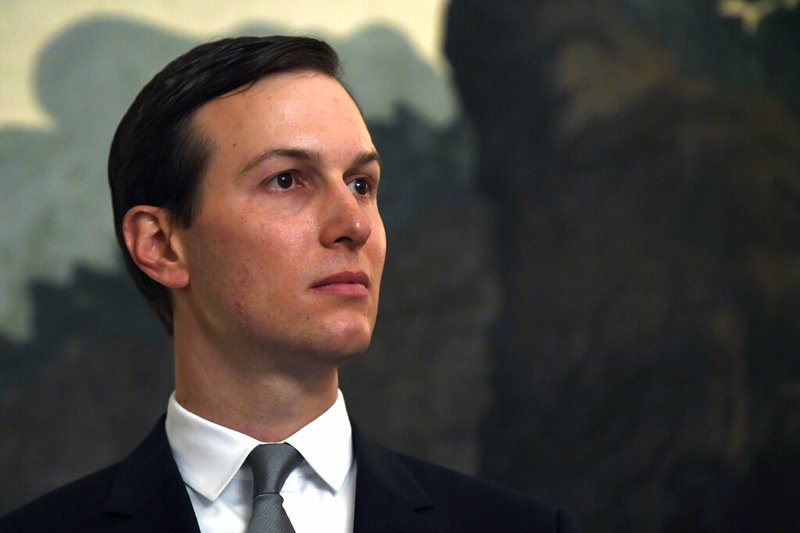MANAMA, Bahrain — Amid heavy skepticism and deep doubts about prospects for success, the Trump administration on Tuesday was convening an international conference to promote its ambitious but harshly criticized $50 billion economic support plan for the Palestinians.
President Donald Trump's son-in-law and senior adviser, Jared Kushner, was to kick off the two-day workshop in the tiny Gulf kingdom of Bahrain with a speech to some Arab finance ministers, the heads of international financial organizations and private sector business executives and investors from dozens of states. But the participants notably do not include official Israeli or Palestinian delegations, and many countries' delegations are not headed by Cabinet ministers.
The Palestinians have rejected the proposal — which aims in 10 years to create a million new jobs, slash unemployment and improve living standards in the West Bank, in Gaza and among Palestinian communities in Egypt, Jordan and Lebanon — because it does not include a horizon for ending Israel's occupation and granting them independence. U.S. officials say the political portion of the plan that Trump has dubbed the "deal of the century" addressing such thorny issues may not be released until fall.
Without proposals on borders, the status of Jerusalem and the fate of Palestinian refugees, the Palestinians say the economic plan is meaningless and are staging protests against the "Peace to Prosperity" workshop. Palestinians in Gaza called a general strike, with stores and public institutions shuttering to protest the meeting, and demonstrators in the West Bank carried a giant coffin labeled "Bahrain workshop" and signs reading "The Deal of the Century is doomed."
Besides opposition from the intended beneficiaries of the proposal, the plan has been harshly criticized by former diplomats, aid workers and others involved in past peacemaking efforts for being unrealistic and lacking any clear description of who will pay for it.
Trump, Kushner and U.S. Treasury Secretary Steven Mnuchin argue that a new approach is needed precisely because previous efforts have fallen short. They note that the heads of the International Monetary Fund and the World Bank will attend and speak at the event, as will the head of FIFA, the international soccer federation, and the managers of numerous large investment funds.
Yet, enthusiasm has been tempered by the Trump administration's refusal to endorse the creation of a Palestinian state in the West Bank, Gaza and east Jerusalem, the "two-state solution" that has been long viewed internationally as the only viable path to lasting peace.
The Palestinians cut ties with the White House after Trump recognized contested Jerusalem as Israel's capital in December 2017, and say they will not accept a peace proposal from an administration they see as hopelessly biased toward Israel. Trump's Mideast team has recently signaled it will accept Israeli annexation of parts of the West Bank, the heartland of any Palestinian state, deepening Palestinian suspicions.
Even the Arab delegations attending the meeting in Bahrain have couched their participation with reaffirmations of support for an eventual Palestinian state.
Saudi Arabia, one of the few Arab countries to be sending its foreign minister to the event, said it remained committed to that end with a state based on the border that existed before the 1967 Arab-Israeli war.
"The Kingdom reiterates its firm position on the Palestinian cause and solving it in accordance with the Arab Peace Initiative, which called for establishing an independent Palestinian state along the borders of 1967 with East Jerusalem as its capital," the Saudi government said in a statement.
Egypt and Jordan, the only Arab nations to have signed peace deals with Israel, are sending only mid-level representatives to Bahrain and said they would not abandon demands for a Palestinian state.
At a ceremony hosted by Israel's president to mark 40 years of Egyptian-Israeli peace on Tuesday, Egypt's ambassador to Israel, Khaled Azmi, said his country's "vision was, and still is, based on full nation-statehood and security for everyone in the region."
"The goal we aim to achieve through negotiations between the two parties is one that is based on justice, legitimate rights and mutual willingness to coexist in two neighboring independent states living in peace and security," he said.
Morocco is also taking part in the Bahrain workshop, but the foreign ministry qualified its participation by noting its delegation is headed by a member of the finance ministry, and saying in a statement that "the constant and unchanged position of the Kingdom of Morocco, (is) in favor of a two-state solution, living side by side in peace and stability."
Bahrain, which has close ties to the Saudis, has been criticized for hosting the conference and sharply limited the number of journalists allowed to cover it. It has defended its decision by saying its only objective is to support the "brotherly Palestinian people."
Although Bahrain has cracked down on dissent, Bahraini opposition voices protested the meeting on social media, particularly on Twitter, where Arabic hashtags about the workshop were trending under banners "Down with Bahrain conference" and "Down with the Deal of Shame." Many of the Arabic tweets were fiercely critical of the workshop, with posts saying "Palestine is not for sale," images of Palestinian children detained and blindfolded by Israeli security forces and cartoons mocking Gulf Arab states for attending.
In Kuwait, which has the most freewheeling political system in the Gulf, several members of parliament openly called on the country's officials to boycott the workshop and any attempts at normalization of ties with Israel.
Read Wednesday's Arkansas Democrat-Gazette for full details.
